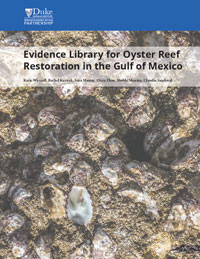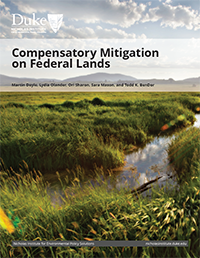Publications
Evidence Library for Oyster Reef Restoration in the Gulf of Mexico
Oyster reef restoration influences the ecological and social systems to create outcomes important to people. These effects are illustrated in an ecosystem service logic model (ESLM), and the evidence library summarizes the scientific evidence for each relationship shown in the ESLM. The evidence library summarizes the scientific evidence for the biological, ecological, and socio-economic effects of oyster reef restoration in the Gulf of Mexico.
Compensatory Mitigation on Federal Lands
This report represents an examination of compensatory mitigation of aquatic resources (i.e., streams and wetlands) on U.S. federal lands through an examination of case studies and a review of the legal landscape in which such mitigation takes place.
GEMS Phase I Report: Oyster Reef Restoration
The GEMS (Gulf of Mexico Ecosystem Service Logic Models and Socio-Economic Indicators) team will develop ESLMs and metrics for a wide range of coastal restoration approaches over the course of the project. This report presents the results of the first phase of the GEMS project, which focused on oyster reef restoration.
Aligning Evidence Generation and Use Across Health, Development, and Environment
Although health, development, and environment challenges are interconnected, evidence remains fractured across sectors due to methodological and conceptual differences in research and practice. Aligned methods are needed to support Sustainable Development Goal advances and similar agendas. The Bridge Collaborative, an emergent research-practice collaboration, presents principles and recommendations that help harmonize methods for evidence generation and use.
Bigger Change Faster
This report, co-authored by the Bridge Collaborative and UNDP, highlights three global challenges that require cross-sector solutions, and actions that can be taken now to drive bigger change faster for people and the world we share.
Forecasting Ecosystem Services to Guide Coastal Wetland Rehabilitation Decisions
Coastal wetlands provide diverse ecosystem services such as flood protection and recreational value. However, predicting changes in ecosystem service value from restoration or management is challenging because environmental systems are highly complex and uncertain. Furthermore, benefits are diverse and accrue over various timescales. We developed a generalizable mathematical coastal management model to compare restoration expenditures to ecosystem service benefits and apply it to McInnis Marsh, Marin County, California, USA.
Assessing Ecosystem Service Benefits from Military Installations
Military bases provide substantial ecosystem services to local communities and other members of the public. This project conceptualizes and quantifies ecosystem services provided by U.S. military bases developing an integrated modeling platform called MoTIVES (Model-based Tracking and Integrated Valuation of Ecosystem Services). MoTIVES manages probabilistic simulations of biophysical and economic models for relevant ecosystem services provided by alternative base management scenarios, and then assigns values where valuation is possible.
Workshop Guide: Using Facilitation Techniques to Integrate Ecosystem Services into Coastal Management Decisions
Estuarine systems are areas of immense ecological importance and provide numerous social, economic, and environmental benefits. The strong link between healthy habitats and these benefits requires incorporating the concerns of both nature and people into coastal management. An ecosystem services approach to coastal management and stewardship is defined by consideration of those benefits that flow from nature to people.
Reducing Environmental Risks from Belt and Road Initiative Investments in Transportation Infrastructure
The proposed Belt and Road Initiative rail and road investments have stimulated concerns because of the history of significant negative environmental impacts from large-scale transportation projects across the globe. This paper studies environmental risks—direct and indirect—from Belt and Road Initiative transportation projects and the mitigation strategies and policies to address them. The paper concludes with a recommendation on how to take advantage of the scale of the Belt and Road Initiative to address these concerns in a way not typically available to stand-alone projects.
Ecosystem Services Conceptual Model Application: Bureau of Land Management Solar Energy Development
This report presents an ecosystem services conceptual model that captures the potential ecological and human well-being outcomes of the installation and operation of solar energy facilities on land managed by the Bureau of Land Management. An accompanying evidence library provides a summary of the currently available evidence for each relationship in the model and an assessment of the strength of that evidence. The model could improve and help to streamline the Bureau of Land Management's environmental assessments. The report is part of the Conceptual Model Series produced by the National Ecosystem Services Partnership.










